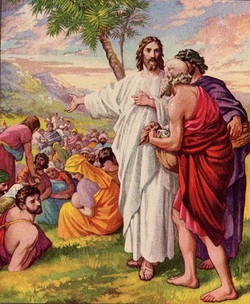
The evening was approaching, and still the crowd, charmed by the words of Our Lord in His sublime instruction, made not the least move to leave Him and go to their homes in the city, nor did they even think of procuring food. Our Lord was still busy healing the sick. What a preacher He must have been! You see the mass of people, closely gathered about Him, listening with eagerness to every word addressed to them, and so intent are they that they forget their food.
In the time of Our Lord there were thousands who went to Him with a good heart; He loved them for it and this evening they were to be the guests of the divine Master. In our day we do not as a rule find that hunger after the word of God; people do not like sermons, and especially young people can hardly contain themselves and sit still to listen to the word of God. Parents can plead and threaten, the confessor can admonish, the pastor shows his zeal in vain. But what great damage results to our soul from this carelessness! From this comes that ignorance of religion and God and blindness of the mind which is the mother of all evil. From this you can trace the hardness of men's hearts, obstinacy in vice and sin, and at last eternal damnation. There is not, says St. Bernard, a more certain sign of people losing their immortal souls than their aversion to the word of God.
One day as St. Hilary was about to preach, after having finished the reading of the Gospel, many got up to go out. The saintly preacher was stirred, and he called to them to return and resume their places, saying, "You are going out, but you will not so easily go out of hell." It is related of St. Anthony of Padua that he wanted to preach to a number of heretics, but they all went away and would not listen; he then went to the seashore and began to preach to the fishes.
"Listen to the word of God, ye fishes of the sea, for these unhappy heretics will not listen to me." With that an immense number of fishes gathered as near as they could come to him, with their heads slightly raised out of the water as if they were all attention. When St. Anthony saw this he said,
"Blessed be God, for the fishes honor God more than the people of the earth." In many churches is witnessed this eagerness to run away, and to such these words can be applied,
"You can easily leave the church, but you cannot so easily get out of hell."
Dear children, if you wish to save your souls and go to heaven, it is absolutely necessary to hear the word of God.
When our dear Lord saw this great crowd of people that had followed Him and had continued with Him so as not to lose one of His discourses, He was touched with compassion for them. Turning to Philip, one of His disciples. He asked him,
"Whence shall we buy bread, that these may eat?" Philip answered Him,
"Two hundred pennyworth of bread is not sufficient for them, that every one may take a little." Our Lord, calling the Apostles about Him, asked,
"How many loaves have you?" Andrew answered,
"There is a boy here that hath five barley loaves and two fishes, but what are these among so many?" "Bring Me," said Our Lord, "the little you have, and make the people sit down on the grass." Our Lord then took the loaves, and, raising His eyes to heaven, blessed them, and distributed to them that were sat down. What a magnificent miracle Our Lord worked for the benefit of His followers on this occasion! Be ye also true followers of Jesus; live in His holy love and fear, and He will provide for you in all your necessities. Would that you were convinced of this! There are, indeed, many who have to undergo terrible sufferings, some even die of hunger; but you must not accuse almighty God of carelessness in their regard.
Often it is their own fault on account of the bad lives they have led. Wickedness produces untold evil in this world; you know there are many young people who lead impious and criminal lives, who are Catholics only in name, who never go to confession, though they have been taught to go from their early childhood; they do not go to communion nor observe Sundays and holydays; they blaspheme the word of God, and they act worse than the brute in the pursuit of the object of their passions. God will not prosper such as these, they cannot have the peace of mind which is the share of those who serve God; they are harassed by discontent and anger, and these vices sometimes produce terrible effects, and could really be a sufficient explanation of much of the misery with which we find poor humanity afflicted. Yes, if sin could be removed from this world, no doubt many of the scourges which come upon us, many sicknesses, terrible and unforeseen deaths, would be removed also and heavenly peace would reign supreme. Often and often we read of this in the word of God. The impious are told that they are hurrying toward their destruction, and the good are the favorite children of God. But, you will say, the good are often afflicted; for we have met them suffering hunger, misery, and persecution.
Why does God allow His faithful followers to be so tried, as was the good and holy Job? God permits these trials to the just to purify them, to detach them from the things of this world, and to give them opportunity to merit more for eternal life. God reigns supreme in the hearts of the just; He gives them His grace to suffer with patience whatever may come to them, and this is the reason that these trials are no longer afflictions but rather consolations. St. Paul says, "We glory also in tribulations."
The loaves which fed such a multitude represent the Holy Eucharist. Every day this mystical bread is multiplied and distributed from the altar. What a great gift is this Blessed Sacrament, what a proof of God's love for His children, what a display of His omnipotence! The bread on our altars remains no longer bread; it is changed by the power of Jesus Christ into His sacred body and blood. With this bread you can feed your soul every day. It is natural fo suppose that the crowd that was fed miraculously had knowledge of it, and ate that blessed bread with avidity. What fervent thanks did they not return to Him who had so favored them! The same joy tills the heart of the generous young man or woman after the reception of the body of the Lord. You have felt this; it is the greatest consolation and the most exquisite enjoyment of your life.
Many there are who do not realize what they do, and are cold and indevout. To them communion is without consolation; they go, perhaps from habit or because their companions of a sodality are going in a body, but not that they really hunger; after this Bread of life. It is related of a young man, whose wicked parents did not wish him to go to communion, that by some means he eluded their vigilance, and at the very dawn, when no one in the house was yet stirring, he would hasten to first Mass and go to communion; then making his thanksgiving on his way back, he went to bed again before any one had noticed his absence. This young man appreciated the happiness of holy communion. Let us approach this sacred banquet and eat our fill; we will derive strength and endurance from it. If Our Lord sees us approach with affection. He will return love for love and be the greatest friend we have.
But you, smaller children, my lambs, who have not yet had the happiness of drawing so closely to Our Lord, look forward to the day of your first communion; you are now learning the teachings of the Church concerning the real presence; you are beginning to distinguish this Bread of angels from ordinary bread, and as soon as you reach the use of reason you will be admitted to the divine festival. Be anxious to know your holy faith by learning the Catechism; try to realize that it is Jesus you are going to receive, and begin now to form in your heart sentiments of great love and desire.
Mary Magdalen of Pazzi, when a young child, had a great desire to go to communion; but she was denied the happiness because she was not old enough. She had a great knowledge of Jesus on the altar in the Blessed Sacrament, and spent hours on her knees in the church. At one time her mother went to communion and little Magdalen saw her. How beautiful her mother looked! The child was so struck at the sight that she begged to be allowed to make her first communion, that she, too, might feel that great happiness. She afterwards called the days of communion days of love. I cannot persuade myself even now to cease speaking of the Blessed Sacrament. Approach the altar with exterior as well as interior reverence and holy fear. Let the world, your companions and the parish, see that you realize the sacred act in which you are engaged. Your mind must be centred on the great God whom you are to receive, and you certainly know that you owe Him fervent love and holy fear. St. Thomas a Kempis, in his "Following of Christ,^' says, "If you had the purity of the angels or the sanctity of a John the Baptist, you would not be worthy to touch this Holy Sacrament."
Holy men and women know that they are not good enough to go to communion; still they go because Our Lord draws them to it. With what severity they judge themselves and make their confession, so that every stain of sin may be effaced! It is a dreadful action to go to Jesus and receive Him who is the God of the universe.
After this great number of people had been fed, they were enthusiastic; they wished to take Jesus and make Him their king. But Our Lord wanted no temporal dominions, so He
hid Himself from them. He wishes to be king of your heart. After having received Our Lord, it is your duty to make Him the king and master of your soul. Be faithful to Him, be not a disciple like Judas, who betrayed Him. No longer allow the devil to have the direction of your actions. Let Our Lord alone have His throne there, Jesus the good Master, the Prince of peace, the God of joy and of all consolation. A great missionary once laying his finger on a wicked man's heart asked, '^Who reigns in this heart, God or the devil?" Ask yourselves the same question, and your conscience will give the answer; in fact, you know it already, if you are in real earnest about your eternal welfare.
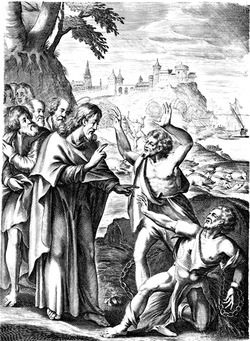
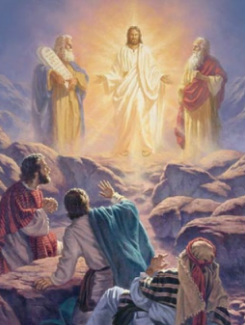
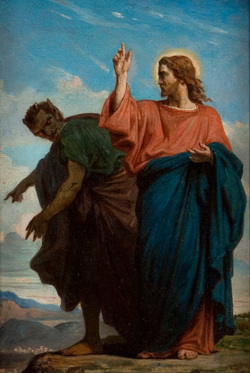
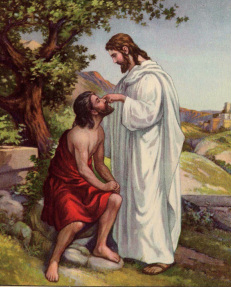
 RSS Feed
RSS Feed